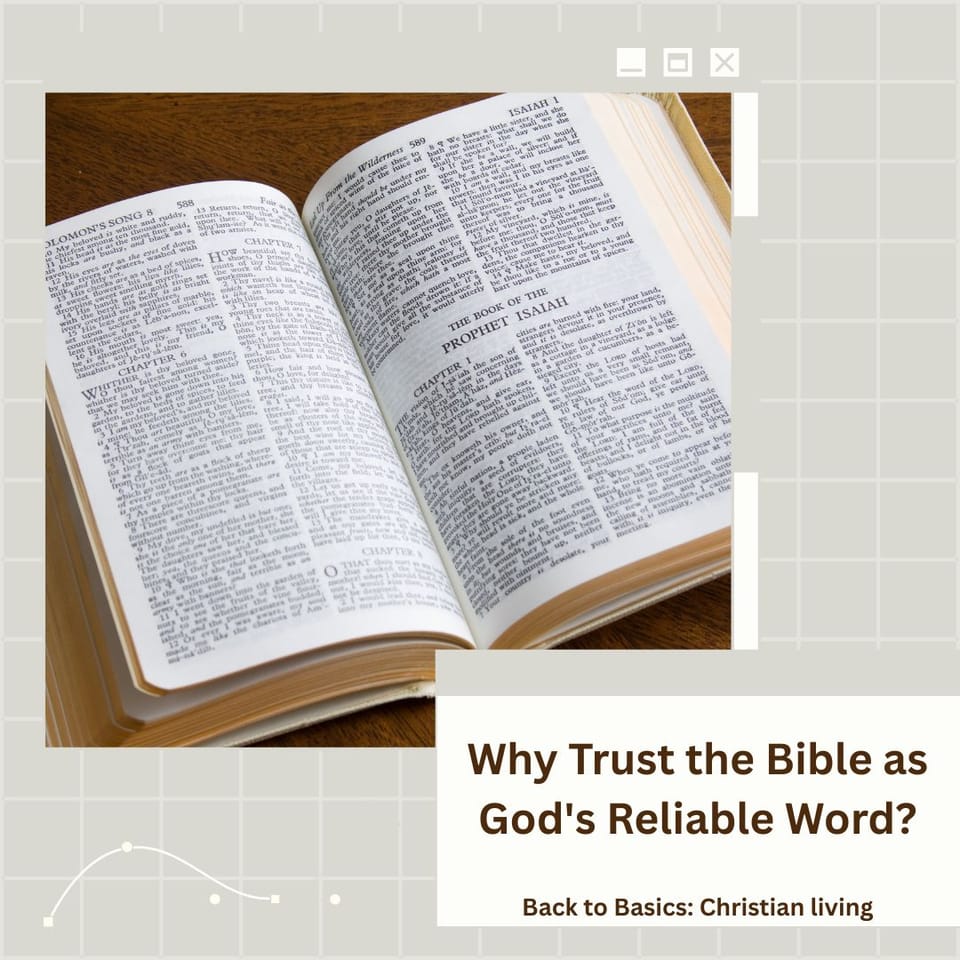Why Trust the Bible as God's Reliable Word?

The Bible's Reliability: Evidence & Faith!
Q. I’m not Christian, I would like to ask you why I should believe that the Bible is a reliable source of information and if so then which one as I’m aware there are multiple versions with constant updates…
The question of why one should believe the Bible is reliable and which version to trust is fundamental for anyone exploring Christianity. These concerns deserve thoughtful consideration, as they touch the very foundation of Christian faith…
Exploring the Evidence, Authority & Transformative Power of Scripture….
The Bible stands unique among ancient texts in several remarkable ways. Its historical reliability has been consistently validated through archaeological discoveries that confirm biblical accounts, places, and people. Unlike mythological texts, the Bible contains specific historical details that can be verified.
The apostle Peter addresses this directly: "For we have not followed cunningly devised fables, when we made known unto you the power and coming of our Lord Jesus Christ, but were eyewitnesses of his majesty" (2 Peter 1:16 KJV). The Bible claims to be eyewitness testimony, not legends developed over time.
The manuscript evidence for the Bible is unparalleled. With over 5,800 Greek manuscripts of the New Testament and tens of thousands of quotations from early church writers, no other ancient document comes close to this level of textual support. The Dead Sea Scrolls discovered in 1947 contained Old Testament texts dating from around 250 BC that matched our modern texts with remarkable accuracy.
However, the Bible's reliability ultimately goes beyond historical verification. Jesus said, "My doctrine is not mine, but his that sent me. If any man will do his will, he shall know of the doctrine, whether it be of God, or whether I speak of myself" (John 7:16-17 KJV). This profound statement suggests that full certainty comes through application—by putting God's word into practice.
The Living Word: Meant to Be Applied
The Bible itself claims to be "quick [living], and powerful, and sharper than any two edged sword" (Hebrews 4:12 KJV). Unlike other religious texts, it invites testing through application. The Psalmist declared, "The word of the LORD is tried [proven, tested]" (Psalm 18:30 KJV).
James urges believers to "be ye doers of the word, and not hearers only, deceiving your own selves" (James 1:22 KJV). The Bible's reliability is meant to be proven through active application, not merely intellectual analysis. When we apply biblical principles to our lives, their truth becomes evident through transformed hearts and circumstances.
Consider Christ's teachings on forgiveness, love of enemies, or freedom from worry. When applied, these principles demonstrate their divine origin through their effectiveness and the peace they bring. As Jesus promised, "If ye continue in my word, then are ye my disciples indeed; And ye shall know the truth, and the truth shall make you free" (John 8:31-32 KJV).
Faith: The Essential Element
The writer of Hebrews states plainly that "without faith it is impossible to please him: for he that cometh to God must believe that he is, and that he is a rewarder of them that diligently seek him" (Hebrews 11:6 KJV). Faith is not blind acceptance but trust based on evidence and experience.
Faith itself is described as "the substance of things hoped for, the evidence of things not seen" (Hebrews 11:1 KJV). This faith becomes the foundation for experiencing God's reality. The Bible presents itself not merely as a historical document but as "the power of God unto salvation to every one that believeth" (Romans 1:16 KJV).
When approached with faith, Scripture becomes more than ancient text—it becomes God's living voice. Jesus said, "the words that I speak unto you, they are spirit, and they are life" (John 6:63 KJV). This transformative power is what sets the Bible apart from other literature.
Which Bible Version Can Be Trusted?
Regarding different Bible versions, it's important to understand that translations differ primarily in how they render the original Hebrew, Aramaic, and Greek texts into modern languages, not in their fundamental message.
The King James Version (KJV) has stood the test of time since 1611 and remains revered for its literary beauty and accuracy. It was translated during a period of extraordinary English scholarship and has profoundly influenced Western civilization.
Jesus emphasized that "heaven and earth shall pass away, but my words shall not pass away" (Matthew 24:35 KJV). This promise assures us that despite translation differences, God's essential message remains preserved.
While translations may vary in wording, the core doctrines remain consistent across mainstream versions. The apostle Paul wrote that "All scripture is given by inspiration of God, and is profitable for doctrine, for reproof, for correction, for instruction in righteousness" (2 Timothy 3:16 KJV).
Rather than seeing updates as "improvements" to divine revelation, consider them attempts to accurately represent the original texts in contemporary language. The goal is clarity of communication, not alteration of divine truth.
Testing Through Application
The ultimate test of the Bible's reliability comes through application. Jesus told a parable of two builders—one who built on sand and another on rock. He concluded: "Therefore whosoever heareth these sayings of mine, and doeth them, I will liken him unto a wise man, which built his house upon a rock" (Matthew 7:24 KJV).
The Bible invites us to "taste and see that the LORD is good" (Psalm 34:8 KJV). This experiential knowledge comes through putting God's word into practice. Countless lives throughout history testify to the transformative power of applied Scripture.
King David wrote, "Thy word is a lamp unto my feet, and a light unto my path" (Psalm 119:105 KJV). This guidance becomes evident only when we walk the path illuminated by God's word.
The Bible's reliability rests on historical evidence, manuscript support, and most importantly, its transformative power when applied with faith. While different translations exist, they represent efforts to accurately communicate God's unchanging truth in different languages and contexts.
The invitation of Scripture is not merely to intellectual assent but to life-changing application. As Jesus said, "If ye know these things, happy are ye if ye do them" (John 13:17 KJV).
Perhaps the most compelling evidence for the Bible's reliability is found in the lives of those who have tested its truths through faithful application. The ultimate question may not be "Can I trust the Bible?" but rather, "Am I willing to put its teachings to the test in my own life?"
Key Takeaways:
- The Bible's historical reliability is supported by archaeological evidence and unparalleled manuscript support.
- Scripture invites testing through application - its truth becomes evident when biblical principles are lived out.
- Faith is essential for experiencing the Bible as God's living word rather than merely ancient literature.
- Different translations represent efforts to accurately communicate God's unchanging truth in various languages, not alterations of divine revelation.
- The ultimate test of the Bible's reliability comes through personal application and experiencing its transformative power.





